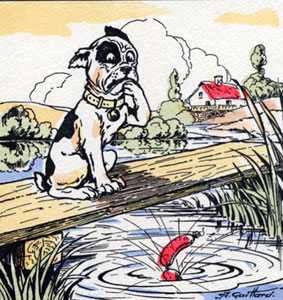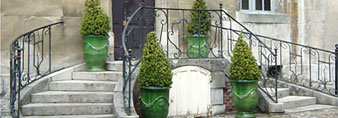Fables, Jean de La
Fontaine
Book VI, fables 17, 18, 19, 20, 21 |
| |
THE DOG THAT DROPPED
THE PREY FOR THE SHADOW (VI, 17)
All men are cheated here below ;
Fools who for substance take its show
We find, nor is their number small ;
Let us to Æsop's dog refer them all.
Holding his prey across a crystal brook,
He the poor shadow for a substance took ;
Let go the solid for the shade he found,
And diving for the shade was nearly drowned.
Through swollen waters he regained the shore,
Nor meat nor shadow saw he more. |
 |
| |
THE WAGGONER STUCK IN THE MUD (VI, 18)
A phaeton whose car was full of hay,
Beheld his wheels sink in the heavy clay.
Poor fellow ! he in vain for succour bawled‑
’Twas far from help of human kind,
In Lower Brittany we find,
Near Quimpercorentin the canton’s called.
A place by fate assigned the bad,
When they are doomed to run right mad
God save us from a journey there so sad
But to the waggoner and luckless cart
Behold him swearing from his very heart,
Invoking vengeance and the blackest curses
Against the holes, and now against the horses ;
Against his cart, against himself he swore.
He called upon that god at length,
So famous for his brawny strength.
“ 0 Hercules !” as loud as he could roar,
“ If it be true what people say,
That thy back carried the great globe one day,
Thy arms can move these wheels with ease."
The prayer gone up, he heard a voice on high,
That answered in such words as these :”
“ Work first, and then to Hercules apply :
Examine what it is obstructs thy way,
And then remove that execrable clay,
And all the wretched mortar that’s here found,
Which, axle-deep, besets thy wheels around.
Then dig the stones up with thy axe,
And then again fill up these tracks.
There, bravely done, I see thou wilt get through ;
Now Lake thy whip, ‘tis all thou hast to do.”
“ Hey ! the cart moves again !” the carter cried,
“ Praise be to Hercules ! “—The voice replied ;
“ Thy horses did it without much ado.
“ Help thyself, Heaven will help thee too.”
|
THE MOUNTEBANK (VI, 19)
The art of quackery is fertile ground,
And its professors everywhere abound.
One bills the town that he beats Cicero,
T'other defies the dreaded flood below.
One like this latter boasted him to be
Of eloquence so great a master, he
Could make a very Cockney learn to speak,
A clod, a clown, a creature with a beak ;
“ Yes, sirs, a clod, a bird, a beast, an ass ;
Bring me Sir Jack, I'll make him pass,
All robed and honoured, in the highest class. ”
His fame soon reached the monarch's ear,
Who bid the wondrous orator appear—
And said : “ I've got a fine Arcadian ass,
Whose beauty in my stable none surpass,
And fain would I an orator were he.”
“ Sire,”cried the quack, “ command and it shall be.”
The man received a certain fee ;
And gave his word that in ten years
Sir Jack should plead before his peers.
“ Or in the pillory,” he cried, “ I’ll stand,
With a rogue's halter strong and thick,
And there be strangled out of hand,
Bearing upon my back my rhetoric,
And wearing on my head the ass's ears.”
Some courtier cried : “ I gladly would be there,
For you no doubt will have a graceful air;
Remember, above all, to cry aloud,
And shower your pathos on the listening crowd,
And then with touching eloquence expose
A certain class of thieves called Ciceros.”
The quack replied : “ Before that day I trust
The king, the ass, or I will lick the dust.”
The man was right, and they are greatly wrong
Who build upon a lease of life too long :
“ Let's eat and drink,” some merry trio cries
But in ten years one of the trio dies. |
|
DISCORD (VI, 20)
The goddess Discord breaking peace on high,
And for an apple troubling all the sky,
Headlong from her divine abode was driven,
And to the animal called man was given,
Who with wide arms received the Deity.
She had with her But-yes-But-no, her brother,
And Mine-and-Thine, her ever-bawling mother.
Discord, from her abode on high thus hurled,
Honoured our hemisphere in this low world ;
Preferring us so civilised,
To those beneath our feet despised,
Folks coarse and savage undisguised,
Who marry without priests and notaries too,
Where Discord has no work to do.
To find the goddess dire .when needed most,
Fame took some pains to fix a certain post;
Forewarned she hastened, changed peace into ire,
And of a spark soon made a blazing fire,
Till Fame complained she was obliged to roam,
For Discord had no fixed, no certain home.
To find her therefore was such running round,
That to some time and spot she must be bound,
Where she by wrangling families might be found.
As nuns and female convents ware unknown,
The goddess wandered still without a throne.
The Inn of Marriage was assigned
At last, the house to suit her mind. |
|
THE YOUNG WIDOW(VI, 21)
The new-made widow cries aloud and sighs,
Consoles herself again and wipes her eyes.
Her sorrow on the wings of Time soon. files,
Time heals the wound that with such anguish bleeds.
Compare the widow of a year,
To the sad widow of a day‑
Who would conceive ’twas she that wore the weeds,
And followed with such grief the bier !
One lures, the other frightens all away,
For ever drooping on the mournful tone,
Till all think every consolation gone.
Such grief is false, and false the falling tear,
As by the present fable will appear.
The husband of a young and charming wife,
Departing life,
Aloud in tears by his bedside she cried,
Before he died :‑
“ Oh, stop, or I must follow thee to--night !
My soul with thine is ready to take flight ! ”
The husband passed the gloomy vale alone.
She had a father kind and wise,
Who let the torrent pass her shaded eyes.
At lest he spoke in this consoling tone :
“ Daughter, your tears from this alarm
Will spoil your every youthful charm.
Let not the dead give such despair,
The living only be your care.
To-day—no, certainly, I don't pretend
That marriage should your sorrows end ;
But time, that wears out every sad adieu,
May make you smile at what I have in view :
A fine young handsome husband—no compare
With your lamented.”—“ Ah ! ” exclaimed the fair,
“A cloister only can give me relief ! ”‑
The father left her to her hopeless grief.
A little weeping month thus passed away ;
The next was spent in changing every day,
Something about her gown of gloominess.
At length her mourning was a buxom dress,
And other tricks her fertile fancy found
That soon brought all the sporting Cupids round.
They reached the dovecot--laughter, dance, and game
Came all in turn. Deep in the fount of youth
She plunged both night and more. To tell the truth,
You’d hardly think that woman was the same.
The father feared the poor defunct no longer,
Yet nothing to the blooming widow said.
“ Where is,” quoth she, “ that youth—I feel much stronger
You promised me ? I'm ready to be wed ” |
EPILOGUE.
Here check we our career,
Long work s I greatly fear.
Far from exhausting all one's stuff,
One ought to think the cream enough ;
To take my breath ’tis surely time,
For I have more to write in rhyme.
Love, tyrant of my life, commands
Me with more work to fill my hands ;
I dare not disobey.
Let me return to Psyche. Damon prays
My art to paint her sad and happy days.
I take that subject for my lay,
It may be by her favour that my vein
Once more will gladly glow.
Happy were I were this the latest pain
Her spouse would bid me know. |
|
|
|



